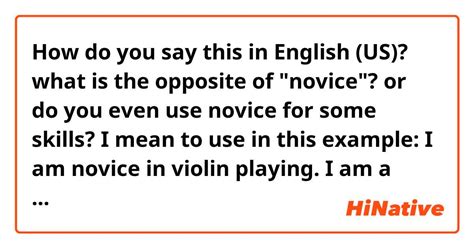Opposite of Expert: Unveiling the Novice's Perspective

In a world that often glorifies expertise, it’s easy to overlook the unique value of the novice’s perspective. While seasoned professionals bring depth and precision to their fields, newcomers offer a distinct set of advantages: unfiltered curiosity, unbiased observation, and a willingness to challenge established norms. This article delves into the often-underrated strengths of the novice, exploring how their fresh eyes can lead to innovative solutions, foster collaborative environments, and drive meaningful progress.
The Power of Beginner's Mind: Seeing What Experts Miss

"In the beginner's mind there are many possibilities, but in the expert's there are few." - Shunryu Suzuki
This Zen proverb encapsulates the essence of the novice's advantage. Experts, while invaluable, can become blinded by their knowledge. They may:
- Overlook obvious solutions: Familiarity can breed contempt, causing experts to dismiss seemingly simple ideas that hold unexpected potential.
- Fall prey to confirmation bias: Experts tend to seek information that confirms their existing beliefs, potentially missing contradictory evidence.
- Become entrenched in established paradigms: Deep knowledge can create intellectual inertia, making it difficult to embrace radical new approaches.
Novices, unburdened by these constraints, approach problems with a blank slate. Their questions, often naive but insightful, can reveal hidden assumptions and open up unexplored avenues.
Case Study: The Power of Naive Questions

Consider the story of a young intern who, during a meeting about a complex software bug, asked, "Why don't we just try turning it off and on again?" While seemingly simplistic, this question led the team to discover a critical oversight in their troubleshooting process, ultimately resolving the issue in minutes.
Key Takeaway: Novice questions, though seemingly basic, can expose hidden flaws and spark innovative solutions by challenging established assumptions.
Beyond Questions: The Novice's Contribution to Collaboration
Pros of Novice Collaboration:
- Fresh Perspectives: Novices bring diverse backgrounds and experiences, enriching discussions with new angles.
- Uninhibited Communication: Less concerned with appearing knowledgeable, novices are more likely to voice doubts and ask clarifying questions, fostering open dialogue.
- Learning Catalyst: Explaining concepts to novices forces experts to simplify and clarify their thinking, benefiting both parties.
Cons of Novice Collaboration:
- Slower Pace: Novices require time to grasp complex concepts, potentially slowing down project timelines.
- Potential for Errors: Lack of experience can lead to mistakes, requiring guidance and oversight.
Despite these challenges, the benefits of integrating novices into teams outweigh the drawbacks. Their presence fosters a culture of continuous learning, encourages knowledge sharing, and promotes a more inclusive and dynamic work environment.
Nurturing the Novice: A Call to Action
Recognizing the value of the novice perspective is only the first step. To truly harness their potential, organizations and individuals must:
- Create Safe Spaces for Questions: Encourage novices to ask "stupid" questions without fear of judgment. Emphasize that no question is too basic.
- Foster Mentorship Programs: Pair novices with experienced mentors who can provide guidance, answer questions, and offer constructive feedback.
- Celebrate "Aha" Moments: Acknowledge and celebrate the unique insights and contributions novices bring to the table.
- Encourage Cross-Pollination: Facilitate interactions between novices and experts from different fields to foster interdisciplinary thinking and innovation.
Conclusion: Embracing the Novice Within

The novice's perspective is not a liability, but a powerful asset. By embracing their curiosity, openness, and willingness to challenge the status quo, we can unlock new possibilities, drive innovation, and create a more inclusive and dynamic world. Remember, even the most seasoned expert was once a novice, and within each of us lies the potential for fresh thinking and groundbreaking discoveries.
Isn’t expertise always superior to novice knowledge?
+While expertise is invaluable, it’s not always superior in every context. Novices offer unique advantages like fresh perspectives, unbiased observation, and a willingness to challenge assumptions. The key is to leverage the strengths of both experts and novices for optimal results.
How can organizations effectively integrate novices into teams?
+Organizations can create safe spaces for questions, foster mentorship programs, celebrate novice insights, and encourage cross-pollination between novices and experts from different fields.
Can novices contribute to complex problem-solving?
+Absolutely! Novices can ask insightful questions, identify hidden assumptions, and propose unconventional solutions that experts might overlook.
How can individuals cultivate a “beginner’s mind”?
+Approach new situations with curiosity, ask questions without fear of judgment, and be open to learning from everyone, regardless of their experience level.
What are some examples of industries where novice perspectives are particularly valuable?
+Industries undergoing rapid change, such as technology, design, and marketing, can greatly benefit from the fresh perspectives and innovative thinking that novices bring.
